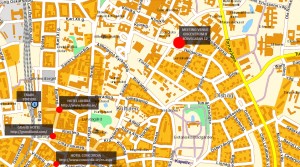Post-doctoral position 3 years
Modelling the nitrogen cycle in agricultural landscapes
Background and skills: We are looking for a highly motivated person to work in a multidisciplinary
project. The successful candidate has a PhD degree in agronomy or environmental sciences with a
background in hydrology or soil science and expertise in improving and using simulation models.
Experiences in the use of geographical information systems, programming (C++, fortran, R) and skills
in database management are an advantage. A good command of French and English is required.
Contract: 3-year duration, imperatively starting before February 2014, monthly gross salary between
2300 € and 2800 € based on experience (French public service scale).
Work environment:
Main location:
– UMR (Joint Research Unit) INRA/AgroParisTech “Environnement et grandes cultures”,
F-78850 Thiverval-Grignon, France, http://www6.versailles-grignon.inra.fr/egc/
Long stays in the following laboratories:
– UMR INRA/Agrocampus “Sol Agro Hydrosystèmes spatialisation”, 65 Route de Saint Brieuc,
F-35042 Rennes, France, http://www.rennes.inra.fr/umrsas/
– UMR CNRS/UPS/INPT/ENSAT “Laboratoire d’Ecologie Fonctionnelle (ECOLAB)” Agrobiopole
Auzeville Tolosane, F-31326 Castanet-Tolosan, France, http://www.ecolab.omp.eu/
Context: The multidisciplinary ESCAPADE project (http://www.n-escapade.fr/, funded by the French
National Research Agency) aims at quantifying the nitrogen cycle and emissions of reactive nitrogen
species (dissolved, gaseous) in landscapes, and assessing the role of the landscape structure on
emissions in various environmental and agricultural contexts. Most of the studies at the landscape
scale have focused on one type of emission (nitrate, ammonia, N2O). The “Nitrogen Cascade”
approach (i.e. the same nitrogen atom emitted in the environment may change forms and induce a
cascade of disturbances) makes it possible to assess the risks of pollution transfer or on the contrary
the synergy effects induced by various agri-environmental measures. The project consortium
includes leading teams at the international level in the monitoring and modeling of nitrogen at
various scales, and experts in hydrology, biogeochemistry, agronomy, bioclimatology and modelling.
Mission: The hired postdoc will contribute to Task 2 of the ESCAPADE project which aims at
developing and applying integrated models (water-soil-crop-atmosphere-farms) of the nitrogen
cascade within agricultural landscapes on instrumented sites. He/she will be more particularly in
charge of data formatting for models, model calibration, interpretation of results, assessment of
model performance, development of complementary modules and scientific writing. To this purpose,
long stays (3-6 months) in the laboratories developing the models and/or managing the
instrumented sites (in particular Rennes and Toulouse) are expected. He/she will interact with the
model developers and the scientists in charge of the experimental sites.
To apply: Send (1) your detailed CV, (2) a motivation letter explaining how your expertise and
knowledge allow you to fulfill the position requirements, (3) the contact details of 3 references to:
– Patrick Durand, UMR SAS, Rennes, leader of the Task 2 of the ESCAPADE project
E-mail: Patrick.Durand@rennes.inra.fr, Phone: +33 223 485 427
– Jean-Louis Drouet, UMR EGC, Thiverval-Grignon, coordinator of the ESCAPADE project
E-mail: Jean-Louis.Drouet@grignon.inra.fr, Phone: +33 130 815 568
Applications will be considered until the 31st of December 2013 or until the position is filled.

 map of the city of Lund
map of the city of Lund